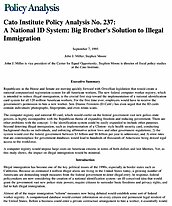The computer registry and national ID card, which would confer on the federal government vast new police‐state powers, is highly incompatible with the Republican theme of expanding freedom and reducing government. There are other problems with the concept: 1) the identification system could be easily expanded to include other purposes beyond deterring illegal immigration, such as implementation of a Clinton‐ style health security card, conducting background checks on individuals, and enforcing affirmative action laws and other government regulations; 2) the system would cost the federal government between $3 billion and $6 billion per year to administer; and 3) error rates that are commonplace for government databases would lead to hundreds of thousands of Americans being denied legal access to the workforce.
A computer registry would impose large costs on American citizens in terms of both dollars and lost liberties. Yet, as this study shows, the impact on illegal immigration would be minimal.

